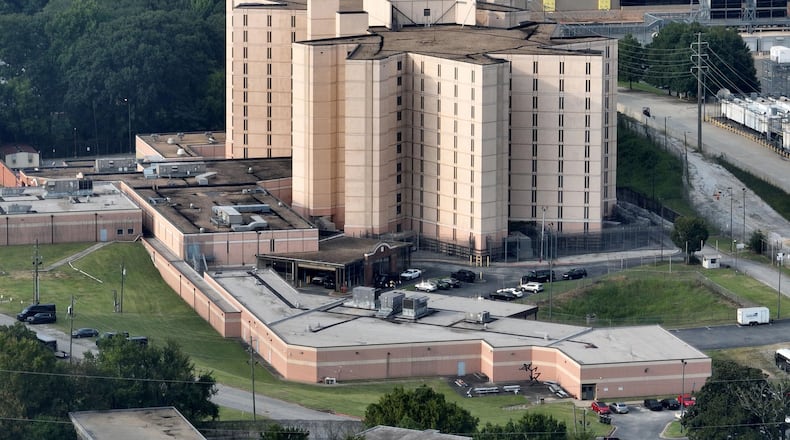As concerns intensify over conditions at the Fulton County Jail and the costs of complying with a federal order to improve them, the Fulton County Commission on Wednesday narrowly approved a $1.2 billion plan to renovate the jail and build a new facility for inmates with special needs.
Four of the commission’s seven members approved the proposal, allowing county staff to refine the plan and conduct community outreach. Of the three commissioners who did not vote to approve the proposal, Mo Ivory opposed it, Dana Barrett abstained, and Marvin Arrington Jr. was absent.
“I think this is a very fiscally responsible approach,” Commissioner Bob Ellis said.
Fulton County, earlier this year, entered a federal consent decree with the U.S. Department of Justice mandating the county and its sheriff to improve jail conditions that federal officials called “abhorrent” and unconstitutional.
A spokesperson for Sheriff Patrick Labat did not respond Wednesday to a message seeking comment on the commission’s vote. Labat and the commission have been perpetually at odds over the sheriff’s management of the jail and how to improve conditions moving forward. Labat supported a $1.7 billion proposal to build an entirely new facility.
The Rice Street building is deteriorating, according to a presentation on Wednesday from ACR Partners, the county’s project manager for jail improvements. The roof, interior finishes, plumbing, fire protection and electrical system are in critical condition, according to the assessment.
Credit: Natrice Miller / Natrice.Miller@ajc.com
Credit: Natrice Miller / Natrice.Miller@ajc.com
Renovations to the Rice Street jail are estimated to cost $552 million, while the new facility for inmates with medical, mental health or other special needs is estimated at $536 million. The county expects to spend another $143 million on maintenance and outsourcing some inmates.
After the renovations and new construction, the Rice Street jail would have a capacity of about 1,600, and the new facility would hold 1,800, all with one bed per cell. At any given time, about 40% to 70% of Fulton’s inmates have mental health or substance abuse issues that could place them in the new facility, Chairman Robb Pitts said Monday.
Commissioners last year voted against building the new jail. At the time, they anticipated renovations and a new facility would cost $300 million. The proposal approved Wednesday is estimated to cost quadruple that.
But the county can finance it, without increasing the tax rate, partly through revenues from tax allocation districts that are expiring, Chief Financial Officer Sharon Whitmore said. The county now is forgoing about $57 million of property tax revenue per year in those districts, she said. The money is instead invested in development in those areas.
Another $50 million per year would come from an anticipated decrease in pension contributions beginning in 2033 as the county’s defined benefit pensions wind down, Whitmore said.
Barrett complained the Rice Street jail costs more per bed to renovate than the new facility costs to build.
“We’re being told by the data you’ve provided that renovating Rice Street is not a cost-effective solution, period,” she said.
Ivory said she was skeptical the county could pay for it all without increasing the tax rate.
Credit: arvin.temkar@ajc.com
Credit: arvin.temkar@ajc.com
“I’ve never seen a project in the history of projects not cost more than the initial estimates,” she said. “This is what I’ve seen that this county does. We do these fake numbers.”
The county expects to begin building the new facility in two years and finish it in 2030. The Rice Street jail would be renovated after that, allowing for some inmates to be moved to the new facility in the meantime. Others could go to Fulton’s annex jails or other jurisdictions.
Several residents and advocates spoke against the plan. Many noted that it wouldn’t change severe understaffing at the jail and blamed Sheriff Labat for what they said was mismanagement.
Four current or former detainees recently sued Labat and the county, alleging fellow inmates stabbed them in the jail and staff did little to intervene.
Inmates are being misclassified and placed in the wrong units, endangering everyone in the jail, said LaQuondria Pierce, a former sheriff’s office employee.
“Imagine being a female officer, managing a floor of 200 inmates by yourself,” Pierce said. “That was our reality.”
The Southern Center for Human Rights submitted pages of questions and a position paper to commissioners. It is unclear whether the court-appointed monitor overseeing the federal consent decree favors the facility plan, they said.
“This proposal relies on deferred action and provides no immediate relief to those suffering in Fulton County jails,” the organization said.
Fulton County is currently leasing 700 beds at the Atlanta City Detention Center, but that lease is due to expire at the end of next year. Some Fulton commissioners have floated the possibility of an extension, but advocates are pushing the Atlanta City Council to end the lease on time so the city facility can be converted into a community center.
About the Author
Keep Reading
The Latest
Featured




